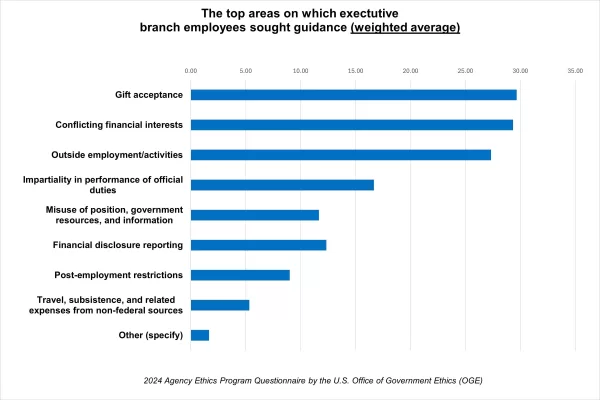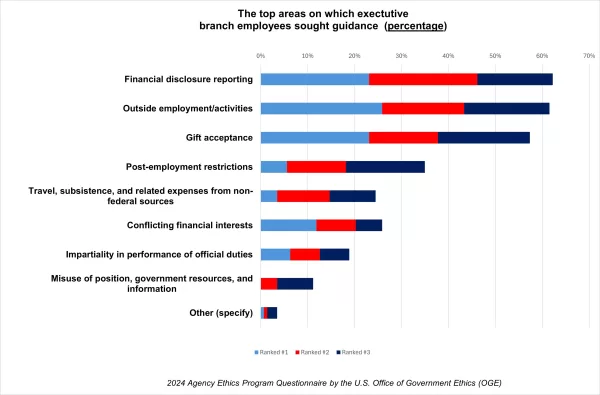Survey data from 143 executive branches informs government ethics shops as to where they should invest time to educate civil servants and political appointees on financial disclosure requirements
Financial disclosure is an unenviable, but necessary, annual task for certain government employees. Broadly speaking, those who are in a position to influence how taxpayer money is spent are required to disclose any potential conflicts of interest in their personal holdings.
As a company, we do a considerable amount of work in this area. Nearly 40 federal agencies have relied on Intelliworx to modernize, customize, and streamline their financial disclosure process. We provide enabling technology that helps ethics offices document, mitigate, track, and report on those disclosures.
Although the process of financial disclosure is typically managed by any given agency’s ethics office, the Office of Government Ethics (OGE) strives to keep tabs at a high-level. As part of this work, executive branch agencies must complete an annual questionnaire fielded by the OGE.
The 60-plus question survey provides a bird’s eye view of the overall ethics program. In the calendar year 2024, 143 executive branch agencies completed the questionnaire. While the results are publicly available, to the best of our knowledge, a tabulation of the data isn’t publicly available, so we did the legwork around one of the most important survey questions.
The top ethics issues concerning government employees
We have a special interest in the 24th question on the survey, which is as follows:
- “From the list below, select the three topics that your employees most frequently sought guidance on in 2024.”
There’s a list of eight possible answer options, including “other.” The respondents, government ethics and compliance officials, are asked to select the top three and rank them. We tabulated the data for just that question, and we’ve graphed the data in two ways:
- a weighted average; and
- each answer by percentage.
Weighted average of OGE ethics data
The weighted average standardizes the rankings to provide a simplified graphic [(1xN + 2xN + 3xN)/3]. This makes it easier to rank the answers numerically.
Here’s how the weighted average stacked up by percentage:
- Gift acceptance: 29.67;
- Conflicting financial interests: 29.33;
- Outside employment/activities: 27.33;
- Impartiality in performance of official duties: 16.67;
- Misuse of position, government resources, and information: 11.67;
- Financial disclosure reporting : 12.33;
- Post-employment restrictions: 9.00;
- Travel, subsistence, and related expenses from non-federal sources: 5.33; and
- Other: 1.67.
There were just four respondents who selected “other,” and respondents wrote in the following descriptions:
- “Agency supplemental regulations”;
- “Widely attended gatherings”;
- “Hatch Act questions”;
- “Supplemental regulations”; and
- “The ethics office reviews invitations for certain personnel to attend and/or speak at events hosted by external entities to ensure compliance with the Standards of Conduct and DoD Joint Ethics Regulation.”
It’s worth pointing out, we’ve added functionality to support these corner cases, such as widely attended gatherings (WAGs), engagement in outside positions, and receipt of travel reimbursements from non-governmental sources to our financial disclosure software (FDonline).
Here’s what that data looks like graphically:
(Click for larger image)
Top three answers by percentage
The same data set can also be visualized in percentage format. This provides a more detailed illustration of the data by ranking as the first, second or third top issue, as reported by respondents.
(Click for larger image)
Although the order of precedence seems to change slightly with this view of the data (as opposed to the weighted average), the top three issues remain uniformly the same across all respondents:
- Financial disclosure reporting;
- Outside employment/activities; and
- Gift acceptance.
What should we do with the data?
The results depict the top issues on which government employees proactively sought out ethics advice – that’s a good thing. Further, the data informs government ethics shops as to where they should invest time in reinforcing that education for civil servants and political appointees.
Answering the most common questions before the filing season begins will help ensure more accurate filings and a smooth review process. That’s important because sparsely staffed ethics offices have just 60 days to certify what is often thousands of financial disclosure forms.
We know this because the tool we field, FDonline, helps over 90,000 civil servants file this disclosure annually. Over the course of time, ethics offices have used our tool to collect, review, and validate more than 600,000 disclosure forms.
Want to know more about FDonline?
FDonline automates your OGE Form 450 process and also supports online filing of Outside Positions , WAG, and travel reimbursement reports as well as online ethics advice tracking. Intelliworx is a FedRAMP-authorized solution with 34 publicly listed authorizations to operate (ATOs) listed on the FedRAMP Marketplace (we have 39 and are working to get the other ATOs listed). Intelliworx is also certified as a Service-Disabled Veteran-Owned Small Business (SDVOSB) by the Small Business Administration (SBA).
Contact us today for a no-obligation online demonstration of the product and see how it can streamline virtually every aspect of the financial disclosure process for your agency.
If you enjoyed this post, you might also like:
10 government ethics best practices for conflict review and financial disclosure





